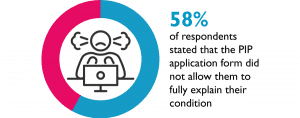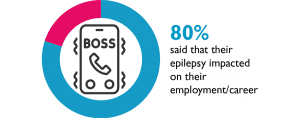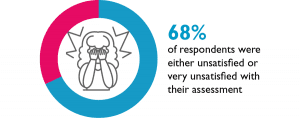Find out more about this campaign
What’s the issue?
Personal Independence Payment (PIP) is a benefit which helps with some of the extra costs of living with a disability or long-term health condition.
However, many people with epilepsy are not getting the help and support they need through PIP.
The current PIP assessment process is not working for people with epilepsy.
The process does not properly assess the impact epilepsy has on an individual’s daily life. The assessment is not able to capture and reflect the nature of epilepsy. Too many people with epilepsy are not successful in their initial assessment for PIP, and have to go through the appeals system to get the support they should be entitled to.
We want the government to make changes to the way that PIP assessments are carried out, to ensure that the process properly takes into account the problems that people with epilepsy have.
What are we doing?
Epilepsy Action surveyed people with epilepsy who have applied for Personal Independence Payments (PIP) to understand their experiences with the benefit system.
People with epilepsy were among the least successful in claiming PIP when compared to people with other health conditions.
Epilepsy Action worked with the Department of Work and Pensions and assessment providers to improve the process and success rates have increased to 71% in 2020. However our survey results show that there are still many improvements that need to be made.

We know that many people with epilepsy face significant barriers to finding and staying in employment. People who responded to our survey stated that they felt their epilepsy had negatively impacted on their employment and careers.

People with epilepsy who completed our survey explained the difficulties they faced during the PIP process.
A lack of understanding
People with epilepsy still feel that assessors do not understand their epilepsy, and that the PIP claim form and assessment questions do not accurately capture the difficulties of living with a fluctuating and invisible condition.
Hannah told us that not only did her assessor not seem to understand the impact epilepsy has on her, they did not take the evidence she provided into account:
“The biggest problem when applying for benefits has been the ignorance and lack of awareness of epilepsy, especially in PIP. I felt in PIP assessments that the evidence I provided was completely disregarded and as a result, I only get half the amount of money I qualify for. I only get the mobility aspect, but not daily living.”
Hannah also explained that the side effects of her medication was not taken into account, something we have heard from many other people:
“was even told that I have no cognitive or memory problems when the medication I am on (oxcarbazepine and ethosuximide) cause memory issues and delayed processing and I have had severe seizures for years.”
As a fluctuating and invisible condition, epilepsy can be a difficult condition for people to understand. The people assessing and making decisions about the level of support that people with epilepsy need should have a greater understanding of the condition.
“A stressful process”
We know that stress is a very common seizure trigger. We have heard all too often that the PIP application process causes people more stress.
Vicky told us that having to go to appeal to challenge the decision to deny her PIP caused her condition to worsen.
“Going through the tribunal was very stressful which caused me to have more and stronger seizures.”
Indeed, many people stated that the stress of the process put them off applying for PIP again in the future.
“This whole process is more stressful than I care to experience as my main triggers are stress. How can I not be stressed at the idea of losing my home, my health and my independence and much more? The whole thing is painful and exhausting and I wouldn’t wish the process on my worst enemy.
“I’m not sure if I will even apply for PIP again when my claim ends as the very thought of the process involved is too traumatic. The whole system needs urgently redesigning, at the very least every assessment must be recorded to prevent the assessors lying. The DWP and ATOS have actually worsened my mental health and increased the frequency of my seizures with the destitution, stress and anxiety they have forced myself and my family to go through twice now.”
People apply for PIP to get extra help and support for living with their condition. The process should not make their situation worse.
Informal observations
We have heard from many people that assessors make so-called “informal observations” that impact on people’s PIP awards. These include noting how people dress, walk and talk and even whether they are wearing make-up.
“My report stated I wasn’t suffering from depression because I gave her eye contact throughout the interview, even though I had evidence from the doctor stating otherwise.
“In the report they miswrote some things and outright lied about others. They claimed I couldn’t have medical issues or seizures because my nails were painted.”
The use of these “informal observations” needs to end. People with epilepsy already have to overcome a lack of understanding of their condition, and on top of this they should not be forced to think twice about what they wear or how they look or sound during their assessment.
Not enough support
Even when people are successful in getting PIP, the amount of money they get is still not enough to cover the extra costs of living with epilepsy.

During the COVID pandemic, Universal Credit was increased by £20 per week to help people with increased costs. However, people receiving PIP received no such extra help.

Many people explained the huge difference increasing PIP by £20 per week would have on their finances.
“£20 per week increases to my PIP would make my life easier in regards to be able to afford occasional trips to visit my family and rare days out with my friends too. I also found it makes it easier with unexpected bills when prices increase that I have that extra £20 that makes all the difference between me struggling and me surviving. This unexpected stress can also cause seizures for those who are triggered by stress such as myself.
“I would love to say I spent my benefit money on things that benefit my condition but unfortunately due to the current cost of living the majority of my benefit money goes on rent and bills. I have four children and keeping a roof over our head has to take priority over anything that may enhance my life. I receive higher rate PIP and the additional £20 would be a massive help as the cost of living has increased substantially over the last 18 months but my payments haven’t gone up to reflect this.”
What we want
In order to ensure people with epilepsy get the support they need through PIP, Epilepsy Action is calling on the government to make changes to the current process.
- We know that frequent re-assessments are a common concern for many people with epilepsy. The length of PIP awards should be increased to avoid these frequent re-assessments. The DWP should also look to use information provided during previous assessments, which would allow assessors to make a paper-based decision, without the need for repeat assessments.
- People with epilepsy should be assessed by someone who has a proven understanding of the condition.
- The cancellation of the Universal Credit uplift will have a hugely negative impact and should be reversed. However people receiving PIP didn’t receive any additional help during the pandemic and this increase should be extended to PIP.
- Many people said that they found the PIP form too complicated to fill in. The form should be simplified and additional support to complete them should be provided to those most in need.
- Reform the activities and descriptors in the PIP assessment and Universal Credit Work Capability Assessment to properly capture the impact of living with a fluctuating and invisible condition like epilepsy.
- Allow people the choice of whether their assessment takes place face-to-face, or by telephone or video.
- Improve feedback from successful appeals to assessment providers, to ensure that the correct decision is made at initial assessment and people are not forced to go through mandatory reconsideration and appeals.
- People often feel that assessors are not listening and do not record their answers correctly. More needs to be done to address the sometimes confrontational nature of the assessment process and instill trust in the process.
- End of the use of informal observations as part of the assessment process
Get involved
We are looking for MPs to support our work to ensure that these recommendations are implemented.
We would like people to raise this issue with their MP.
You can download the attached letter and edit it to explain your own experiences with PIP and send it to your MP.
Got any questions?
Our expert advisors can help you with any questions you might have about living with epilepsy.






